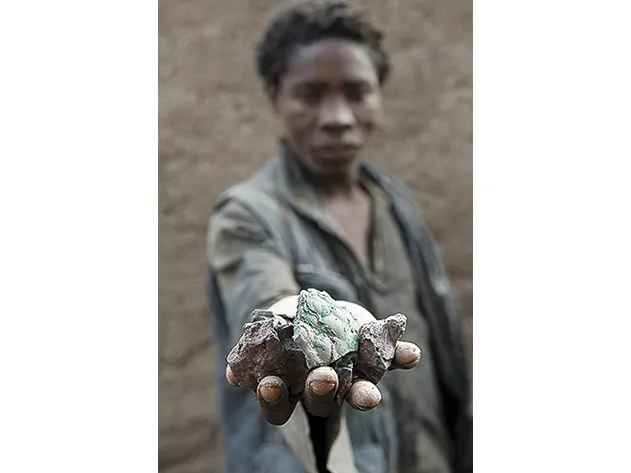Is Your Cell Phone Helping to Fund a Civil War?
The rare minerals used to build your cell phone are coming under scrutiny by federal regulators
/https://tf-cmsv2-smithsonianmag-media.s3.amazonaws.com/filer/conflict-october-2013-631.jpg)
If you’ve shopped for a smartphone lately, you’re aware of the staggering number of options, not to mention the hundreds of thousands of apps available once you’ve got it in your hands. But next summer you’ll have a new choice unlike anything before. And it wasn’t created by a tech company. It’s from the U.S. government. This new feature will ask prospective buyers, in so many words, do you want to contribute to atrocities in the Democratic Republic of the Congo, or not?
Many smartphone components—and those in computers, laptops and video game consoles—are made in part from tin (used for solder), tungsten (which makes units vibrate) and tantalum (which stores electricity). Leading sources for those critically important metals (known as the “3 T’s”) are mined in Congo, where a brutal civil war has claimed more than five million lives since the late-1990s. Rebel militias and renegade army units earn some $185 million a year by controlling access to more than half the mines and collecting bribes and illicit taxes along trade routes.
In the first federal regulation of its kind, electronics firms will soon have to tell the Security and Exchange Commission whether products contain those proscribed “conflict minerals” from mines controlled by armed groups in Congo. Companies with “conflict-free” products may advertise them as such. Presumably other companies will find themselves named and shamed.
“Tell consumers the truth and let them decide if they want to buy products made with minerals that finance gang rape and human rights atrocities,” said Senator Richard Durbin, the Illinois Democrat who was a principal sponsor of the regulation—a bipartisan-supported amendment to the Dodd-Frank Wall Street Reform Act. Companies must comply with the new SEC rules by May 31, 2014.
Nearly 6,000 companies will be affected, and it’s no small thing for them to put their finger on the source of every bit of metal in their complex products. Auditing the global electronics supply chain is the high-tech equivalent of unbaking a cake. By the time tin, tantalum and tungsten reach an assembly line, they will have likely traveled around the globe, from mines in Africa to smelters in Malaysia and through plenty of intermediaries along the way. Critics of the new disclosure rule, including some members of Congress and prominent business associations, say it puts an unreasonable burden on electronics companies.
And companies are clearly worried about the prospect of sticking with the conflict minerals. In an opinion survey by the accounting firm PricewaterhouseCoopers, 57 percent of businesses said that adverse publicity stemming from the use of proscribed metals would tarnish their brand, prompt a shareholder backlash or inspire a consumer boycott.
If consumers do pressure companies to avoid the metals, the thinking goes, that will eventually compel armed groups in Congo to release their strangleholds on mines, allowing profits to go to legitimate companies and their workers.
There’s reason to think the approach might work, given that initial efforts are already having some impact. In 2010, for instance, a coalition of more than 80 companies helped establish the Conflict-Free Smelter Program and agreed not to accept metals from mines controlled by armed groups. Earlier this year, General Electric, Intel and HP financed a fund to help those smelters conduct the elaborate audits needed to verify that their ores were coming from legitimate sources. “You’re really seeing a step-by-step demilitarization of these mines,” says Sasha Lezhnev of the Washington, D.C.-based anti-genocide Enough Project.
Although companies have lowered their manufacturing costs by relying on global suppliers, they’ve also incurred a price. Activists increasingly hold businesses accountable for dealing with countries that violate human rights—and the emergence of social media networks has made it easier for them to publicize their message to American consumers. Companies have responded by creating initiatives such as “fair trade” products to pre-empt boycotts or regulations. But the government decided that the electronics industry did too little too late to address the problem of conflict minerals, and put companies in the hot seat.
Congo remains engulfed by the most deadly conflict since World War II. The campaign against conflict minerals represents an effort to cut off the resources sustaining that war—and history has shown that’s a crucial initial step toward achieving peace.
/https://tf-cmsv2-smithsonianmag-media.s3.amazonaws.com/accounts/headshot/david-zax-240.jpg)


/https://tf-cmsv2-smithsonianmag-media.s3.amazonaws.com/accounts/headshot/david-zax-240.jpg)